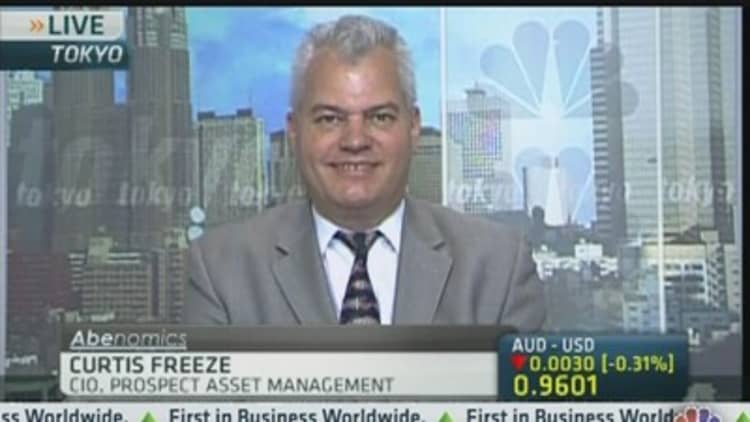Japan's stock market was much calmer on Tuesday after three days of extreme volatility. Still, strategists advised caution after the sharp sell-off.
The Nikkei was up just over 1 percent in mid-day trade in Tokyo, off a two-week low hit earlier in the session. Its losses for the past five days topped 8 percent and sentiment towards this year's best performing major stock market remained fragile.
(Read More: Forget the Volatility, Nikkei May Test 17,00: Charts)

"It [the sell-off] does look like a good buying opportunity, but what you want to avoid is catching a falling knife," said Nick Maroutsos, founder and managing director at Kapstream Capital. "So it would be prudent to see how things play out over the next few days."
Japanese shares tumbled more than 7 percent last Thursday, suffering their biggest one-day percentage loss since the tsunami and earthquake in March 2011.
(Read More: Sell-Off Is Clear 'Warning Shot' for Nikkei: Pro)
Worries about an early end to monetary stimulus in the U.S., weak factory activity data in China and volatility in the Japanese government bond market have all contributed to the sell-off in the Nikkei, taking the shine of its stellar, double-digit gains this year.
"I would go back into the Nikkei but after a correction of another 10 percent, I don't think it's necessary to get involved today," Curtis Freeze, chief investment officer at Prospect Asset Management, which manages about $340 million in assets and runs five Japan-focused funds, told CNBC Asia's "Squawk Box."
Japan watchers say the pull-back in the Nikkei is a correction from the steep rise to 5-1/2 year highs hit less than a week ago, rather than a sign of concern over the economic policies being pursued by Prime Minister Shinzo Abe.
Still, they add that the Nikkei may not resume its climb until there is fresh reason to do so – either in terms of economic data showing solid signs of activity or concrete measures from the government to boost Japan's long-term outlook that may come after elections to the Upper House of parliament in July.
(Read More: Here's What's Different About This Market Rout)
"The [current] mood in the Tokyo equity market is a reaction to the sharp rise we have seen in the past six months, during which market participants have ignored bad news and taken in most of the good news," Yuuki Sakurai, president and CEO at Fukoku Capital Management Job said on CNBC's "Cash Flow."
"After breaching 15,000, we got those comments from Ben Bernanke [on possible Fed tapering] and some weak news out of China, people started to say it's time to take profits…So we might see this pessimistic mood prevail until we see the results of the Upper House elections in July," he added.
— By CNBC.Com's Dhara Ranasinghe; follow her on Twitter @DharaCNBC


